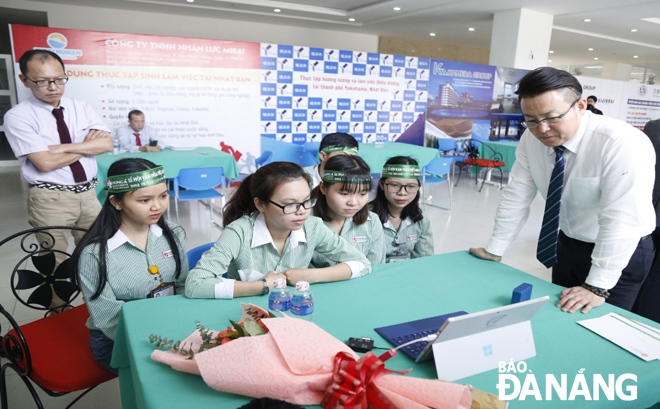The city's students benefit from educational cooperation programmes with Japan
Sending students to Japan for internships is one of the goals that many higher education institutions in Da Nang have been pursuing. The educational cooperation with Japan helps students enhance their professional qualifications and skills, and grasp the opportunity to receive high salaries during their internship periods in “the land of the rising sun”.
 |
| In recent years, Japanese firms have promoted the seeking of high-quality human resources at colleges and universities in Da Nang. Here is a view of the Japan Job Fair at the Dong A University. |
Since 2017, the Da Nang Dong A University has sent its students for internships at Japan-based companies. By late June 2019, this private higher education institution had become a strategic partner providing high quality human resources for 82 major partners, including M&K Group, Suganuma, Aijinkai, Eiseikai; Zensho, Route-Inn, Dormy-Inn, LEOC, Global Design IT; 7 - Eleven convenience store chain, Kameda, Aoyama Medical, Nozomi, Japan Material Engineering Services, JBMA, Asean Car Business Career-Japan, Eikoh Seisakusho, Care Partner, IFECE, and Asrapport.
The school has already entered into comprehensive cooperation agreements with 5 major Japanese cities, namely Yokohama, Maebashi, Chiba, Fukuoka and Shizuoka, along with Japanese organisations.
Last year, a total of 186 undergraduates and graduates from this university worked as interns in Japan with a monthly salary of 1,500 US$ and 2,200 - 2,500 US$ respectively.
At this year’s graduation ceremony, 60 nursing students were also officially employed by Japan-based Aijinkai and Seichoukai social health corporations, bringing the total number of Dong A students participating in internships to 512, as of July.
In a similar vein, during the ongoing 2019-2020 school year, the Da Nang Vocational Tourism College is cooperating with Japanese partners to help its students perfect their soft skills and enhance their professional skills through their high-paid internships at Japan-located tourism firms. The interns are promised high income as they work at such businesses as Kyodai, NCHR.JSC, Okayama Association and MOS Burger.
Likewise, over recent years, the University of Da Nang has established comprehensive and extensive cooperation relationship with many universities, and educational, scientific and cultural organisations, prestigious corporations and businesses in Japan.
In June, the Japan Centre was set up at the university, implementing the mission of promoting comprehensive cooperation in education and training, science and technology and cultural exchange with Viet Nam. The centre is in charge of giving support to scientific research and technology transfer, cooperation activities with Japanese enterprises, supplying high-quality human resources for the Japanese labour market, and giving Japan study support.
These universities received very positive feedback from the Japan-based recruiters on its interns’ good working spirit, attitude, and professional skills. Especially, the Vietnamese employees are usually highly praised for being healthy, hardworking, industrious, honest, eager to learn, and highly-skilled.
In reality, many Vietnamese young people are making good preparations in terms of professional and soft skills to grasp job opportunities to work in Japan, and those from Da Nang is no exception. In reality, the Asian power’s labour shortage is opening doors to foreign immigrant workers, including those from Viet Nam.
Huynh My Hoang, a student of the Business Administration Faculty at the Dong A University, said she was totally satisfied with shared her internship course at the 7-Eleven convenience store business from July 2018 to June 2019.
During her stay in Japan, Hoang gained lots of valuable real-life experience on Japanese business culture, professionalism and communication ski. In addition, she was paid a monthly salary of 25 million VND to cover her living expenses.
According to the city’s experts, the Japanese market is very attractive to young Vietnamese labourers. One of the most inviting factor is that Vietnamese students who are sent to Japan for internship and work programmes usually receive an average monthly earnings of 1.500 US$ each (equivalent to over 30 million VND).
Besides, Japanese businesses show off quite attractive support policies in terms of professional training, travel costs, and accommodation services for guest workers.